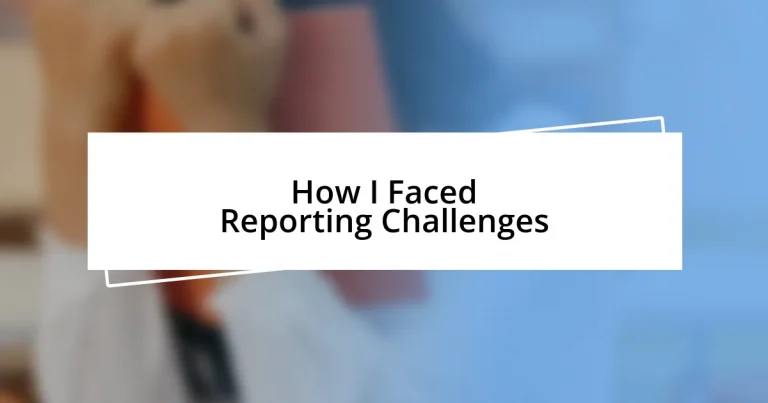Key takeaways:
- Adaptability and flexibility are essential in journalism to navigate unexpected challenges and uncover deeper narratives.
- Collaboration with colleagues can enhance storytelling and alleviate pressure during chaotic assignments.
- Utilizing technology and multimedia tools significantly improves information gathering and audience engagement.
- Continuous self-reflection and peer feedback are crucial for honing reporting techniques and improving narrative quality.
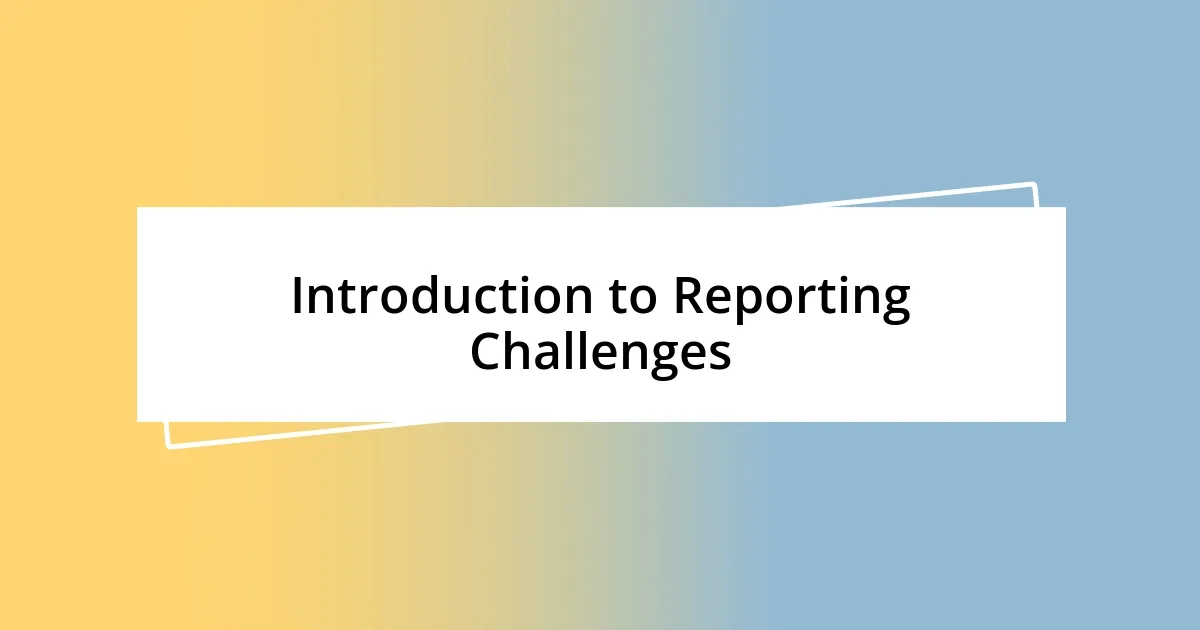
Introduction to Reporting Challenges
Reporting challenges are something every journalist faces, often when least expected. I remember my first on-the-ground event, where a sudden storm shifted everything from logistics to interviews, leaving me feeling overwhelmed. How do we capture the essence of a story when chaos reigns around us?
In my experience, these challenges can range from tight deadlines to navigating complex ethical dilemmas. I once had to revise an entire piece just hours before publication because new information surfaced, and it taught me the importance of adaptability in journalism. Together, these experiences highlight the unpredictable nature of reporting and the vital skills we must develop to thrive.
As I reflect on these moments, I can’t help but wonder: What prepares us for such unpredictability? Embracing uncertainty is crucial; each challenge becomes a learning opportunity that shapes our understanding of storytelling and our ability to connect with our audience. In my journey, these hurdles have transformed into stepping stones towards becoming a more resilient and insightful reporter.
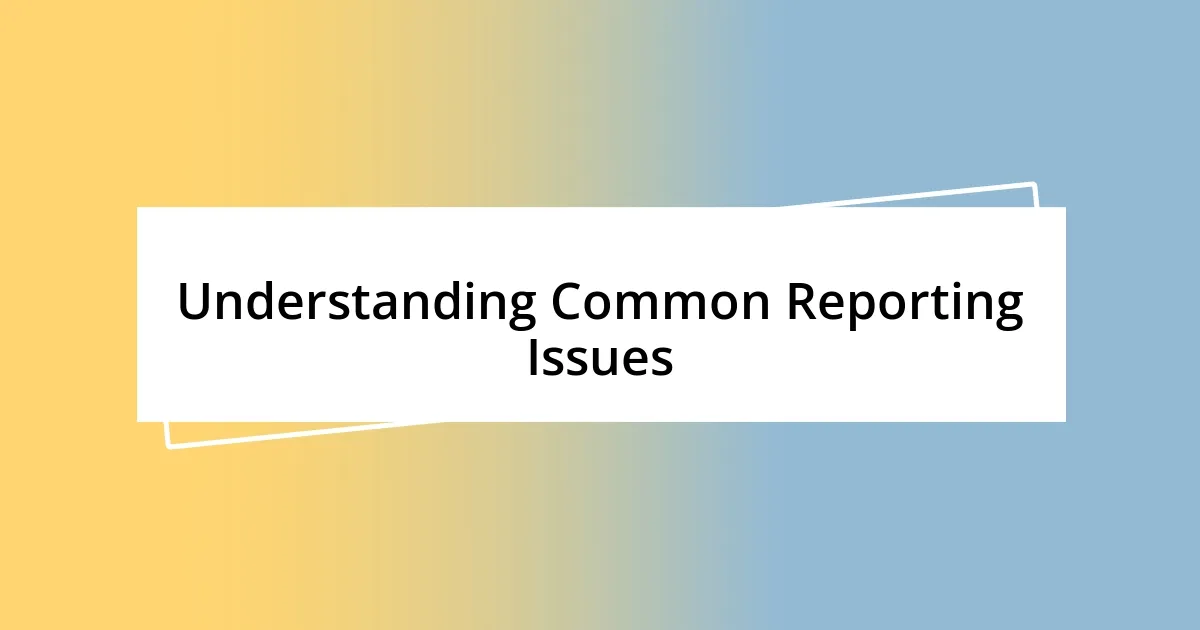
Understanding Common Reporting Issues
Understanding common reporting issues is essential for anyone in this field, as they can significantly impact the quality of a story. I recall a moment when I was covering a community event, and the main speaker canceled last minute. It forced me to pivot quickly and seek out alternative voices, often leading to richer stories than originally planned. This experience showed me that flexibility is key in the fast-paced world of journalism.
There are several reporting challenges that journalists frequently encounter:
- Tight Deadlines: The pressure of submitting stories on time can lead to mistakes or overlooked details.
- Limited Access: Sometimes, sources are unavailable, making it difficult to gather comprehensive information.
- Technical Issues: Equipment failure, like a malfunctioning recorder, can derail an interview.
- Misinformation: Sorting fact from fiction in a sea of information is increasingly complicated.
- Emotional Toll: Coverage of tragic events can weigh heavily on reporters, affecting their well-being.
Every reporting challenge, while daunting, often turns out to be a valuable experience, equipping us with skills to handle future obstacles.
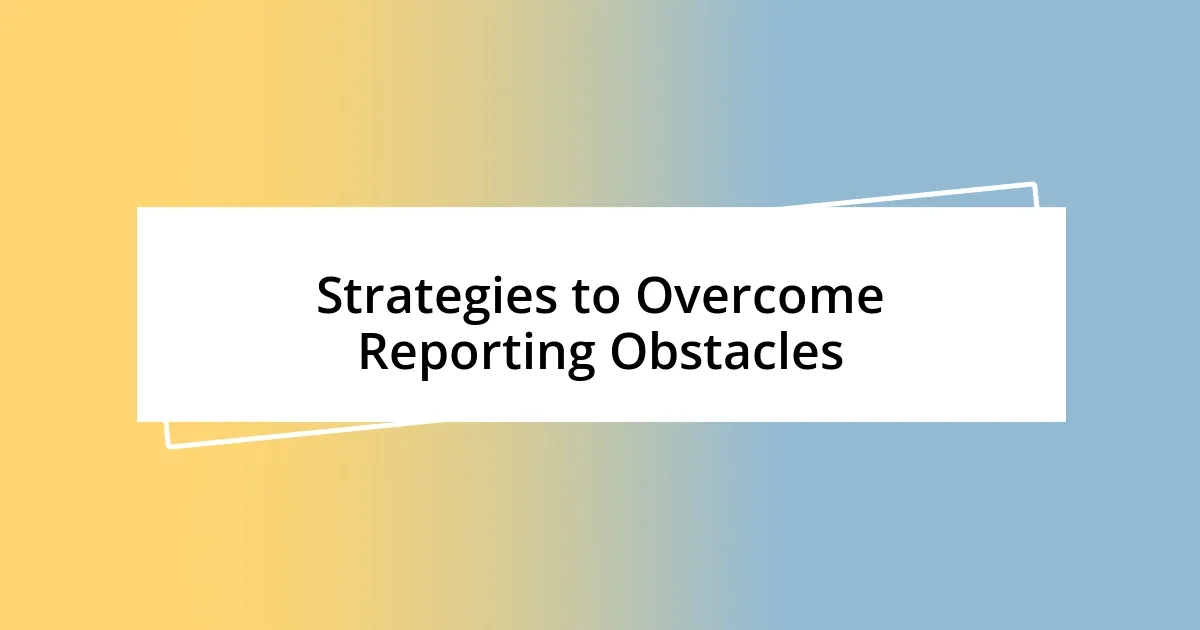
Strategies to Overcome Reporting Obstacles
One of the most effective strategies I’ve developed for overcoming reporting obstacles is to embrace collaboration. On a particularly chaotic assignment, I found myself needing input from fellow journalists. We formed an impromptu team, sharing insights and contacts, which not only eased the pressure but also enriched our stories. This taught me that pooling resources and ideas often leads to more comprehensive coverage and can turn potential roadblocks into collaborative triumphs.
Adaptability is another crucial strategy. I vividly recall covering a political rally that was abruptly cut short due to unforeseen circumstances. Instead of being deflated, I shifted my focus and interviewed attendees outside the event. This change not only salvaged my reporting effort but resulted in authentic reactions that added depth to my piece. I learned that staying flexible in the face of change can open doors to unexpected, powerful narratives.
Moreover, prioritizing mental well-being is often underestimated but vital. After an emotionally taxing assignment on a natural disaster, I recognized the importance of taking time to decompress. I started practicing mindfulness and journaling, which helped me process my experiences and recharge. The ability to clear my mind and step away for a moment significantly improved my focus and resilience for future reporting challenges.
| Strategy | Description |
|---|---|
| Collaboration | Pooling ideas and resources with colleagues can lead to richer stories and alleviate individual pressure. |
| Adaptability | Being flexible and pivoting focus during unexpected changes can uncover valuable insights and narratives. |
| Mental Well-being | Taking time for self-care and reflection enhances resilience and improves overall reporting quality. |
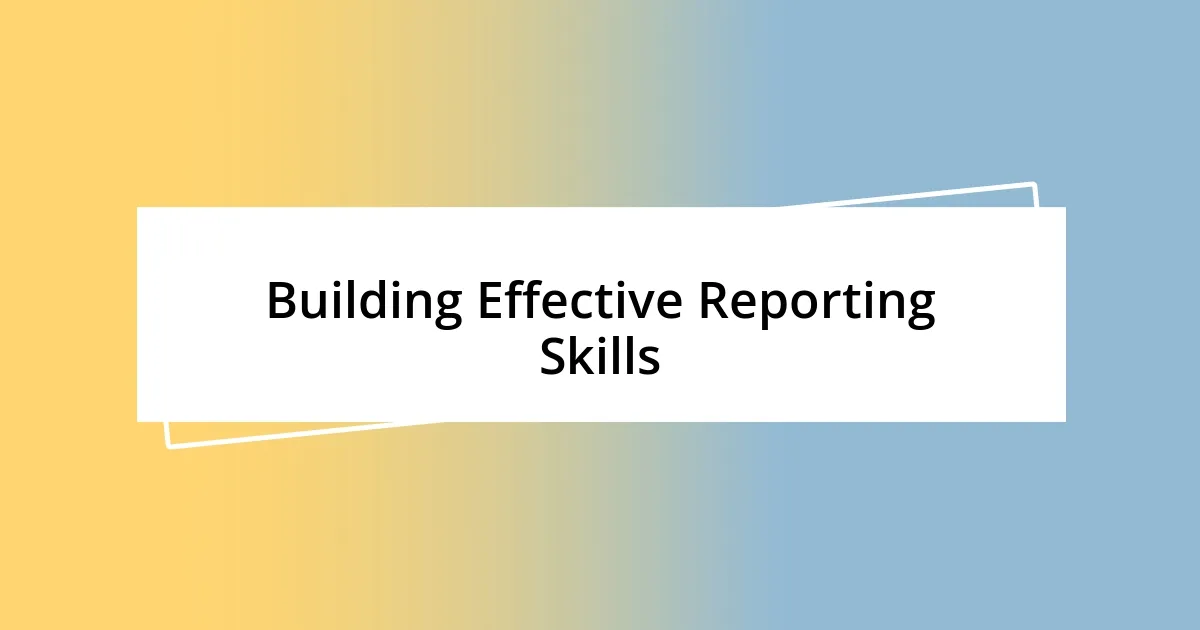
Building Effective Reporting Skills
Building effective reporting skills is about more than just gathering information; it’s also about crafting a narrative that resonates. When I first embarked on my reporting journey, I remember struggling with how to ask the right questions. It was a learning curve, but I discovered that active listening played a crucial role. By genuinely engaging with my sources, I not only gained trust but also uncovered stories that might have been overlooked. Have you ever talked to someone and felt that connection? That’s what effective reporting is all about—making people feel heard.
Another vital aspect is honing one’s ability to distill complex information into digestible content. During a particularly intricate assignment involving a new policy, I noticed how my initial drafts were bloated with jargon. I took a step back and challenged myself: How would I explain this to a friend who isn’t familiar with the topic? This shift in perspective helped me simplify my writing and ultimately made my article more accessible. Have you ever tried explaining something complicated only to realize how confusing your language was? Finding clarity is essential in making sure your audience understands the story you want to tell.
Lastly, it’s important to cultivate a strong network of sources. Reflecting on my experiences, I recall how building relationships within the community not only provided me with timely insights but also created an environment of trust. The more I reached out, the more valuable information flowed in. I often ask myself: Who can I turn to when I need a reliable voice? This proactive approach has been instrumental in my reporting career, allowing me to break stories and offer unique perspectives that others might miss. It’s surprising how people are often willing to open up when they feel a genuine connection. What’s your strategy for building those relationships?
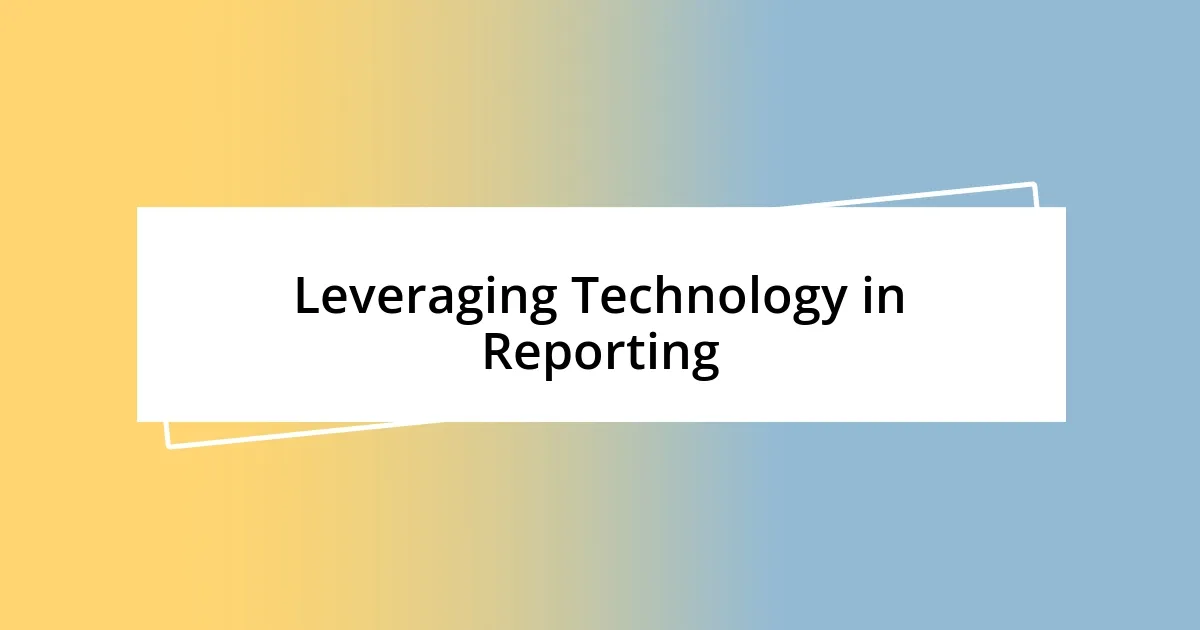
Leveraging Technology in Reporting
Utilizing technology in reporting has transformed how I gather and analyze information. During a recent investigative project, I relied heavily on data analysis tools that helped me sift through mountains of documents. This not only saved me countless hours but also revealed patterns in the data that I may have missed otherwise. Have you ever found a hidden treasure in your research by simply leveraging the right technology?
Additionally, social media platforms serve as invaluable resources for real-time updates and community engagement. I remember covering a sudden local protest where traditional communication methods were too slow. By monitoring Twitter feeds, I could tap into the pulse of the event almost instantly, connecting with participants and gathering quotes on the fly. It felt exhilarating, like being in the heart of the action. Technology not only enhances efficiency but also deepens storytelling with fresh perspectives.
Moreover, I’ve witnessed firsthand how multimedia tools can amplify a story’s impact. On one assignment, I incorporated video elements alongside my written piece, which allowed viewers to experience the stories more vividly. I felt the difference immediately in reader engagement; people shared my article more than they had in the past. This made me wonder: How often do we consider the potential of multimedia in our narratives? Embracing these technological advancements isn’t just about keeping up; it’s about enriching our storytelling and fostering deeper connections with our audience.
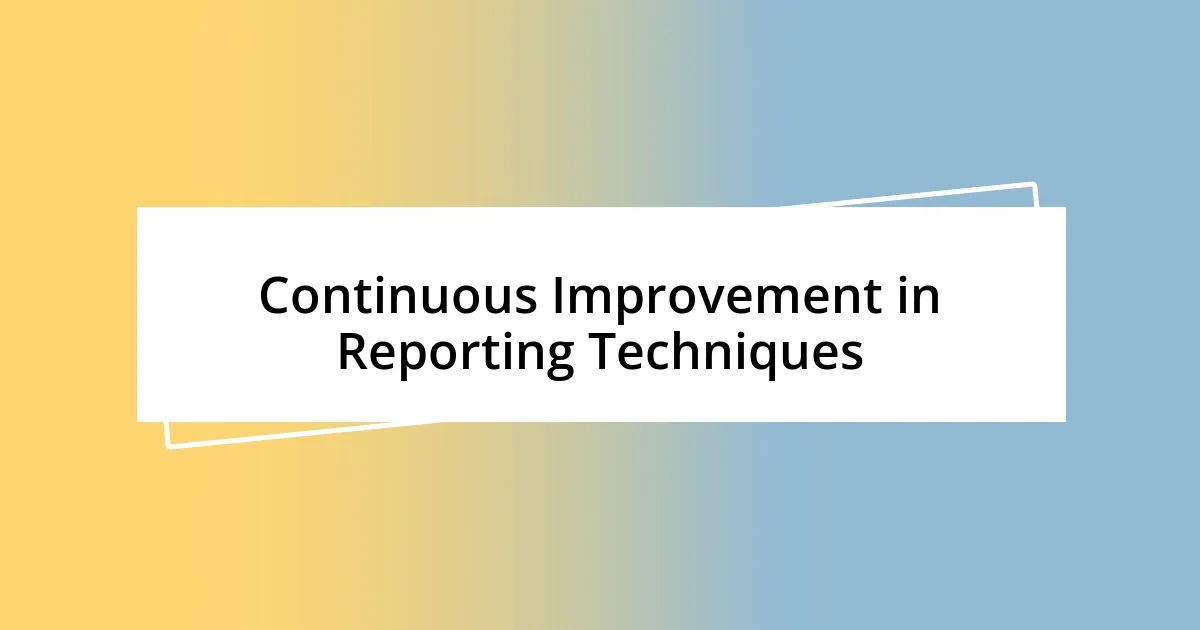
Continuous Improvement in Reporting Techniques
I’ve found that continuously improving my reporting techniques is akin to fine-tuning an instrument. For instance, after facing feedback on a story that fell flat, I made it a habit to analyze what went wrong. Was my angle compelling enough? I realized that diving deeper into my sources’ motivations could breathe new life into my narratives. Have you ever reconsidered an approach only to discover a hidden gem waiting to be uncovered?
One turning point in my reporting journey was the adoption of regular peer reviews. I remember presenting a draft to a fellow reporter and feeling the butterflies in my stomach. The feedback was honest yet constructive, highlighting areas I had overlooked. That moment crystallized the idea that fresh eyes can illuminate paths I hadn’t considered. Who knew that a simple session of collaborative critique could transform a good article into a great one?
Moreover, I’ve embraced the habit of reflective practice after each reporting assignment. I keep a journal where I jot down what tactics worked and what didn’t, which helps me evolve with each story. Recently, as I flipped through my entries, I noticed a pattern: the more specific my questions were during interviews, the more in-depth my stories became. It’s fascinating how a little self-reflection can create a roadmap for continuous improvement. What lessons are waiting for you on the pages of your own experiences?












